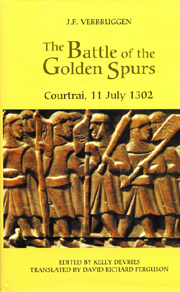 The Battle of the Golden Spurs (Courtrai, 11 July 1302)
The Battle of the Golden Spurs (Courtrai, 11 July 1302) Book contents
- Frontmatter
- Contents
- List of Illustrations
- General Editor's Preface
- Editor's Introduction to the 2002 edition
- Foreword to the 1952 edition
- Acknowledgements (to the 1952 edition)
- Preface: ‘An almost impossible event …’
- Introduction
- Part One Historiography and the Study of the Sources
- Part Two Historical Overview of the 1302 Campaign
- General Conclusion
- Bibliography
- Index
Preface: ‘An almost impossible event …’
Published online by Cambridge University Press: 12 September 2012
- Frontmatter
- Contents
- List of Illustrations
- General Editor's Preface
- Editor's Introduction to the 2002 edition
- Foreword to the 1952 edition
- Acknowledgements (to the 1952 edition)
- Preface: ‘An almost impossible event …’
- Introduction
- Part One Historiography and the Study of the Sources
- Part Two Historical Overview of the 1302 Campaign
- General Conclusion
- Bibliography
- Index
Summary
On 11 July 1302, beneath the town walls of Courtrai, the most splendid army of knights in all Christianity, the flower of French nobility, was thoroughly defeated by Flemish rebels, by common workers and peasants. The superbly trained noblemen who had devoted their whole life to the military profession and were fully experienced in fighting on horseback in close ranks were led by an able commander, the Count of Artois, victor of various campaigns. They were defeated in three hours by men who had little experience of warfare and belonged to the lowest classes of society at that time, men who lived by the unremitting labour of their hands. This army of brave and robust workers – men with ‘dirty fingernails’: weavers, fullers, and peasants – all fighting on foot, was under the command of able leaders and possessed excellent weapons. They put a sudden end to the centuries-old myth of the invincibility of proud and wealthy knights. It was a major blow to the honour and glory of the French noblemen. They were the finest knights of that time, belonging to the most powerful state in Europe, and had not known defeat in the West since before their victory at Bouvines (1214).
‘It was an almost impossible event’ noted the Florentine banker, Villani, who deemed it necessary to detail closely this military exploit, as it was both new and remarkable. When the news of the Flemish victory reached Rome, Pope Boniface VIII was awakened in the middle of the night to read the report.
- Type
- Chapter
- Information
- The Battle of the Golden Spurs (Courtrai, 11 July 1302)A Contribution to the History of Flanders' War of Liberation, 1297–1305, pp. xxiii - xxviPublisher: Boydell & BrewerPrint publication year: 2001


